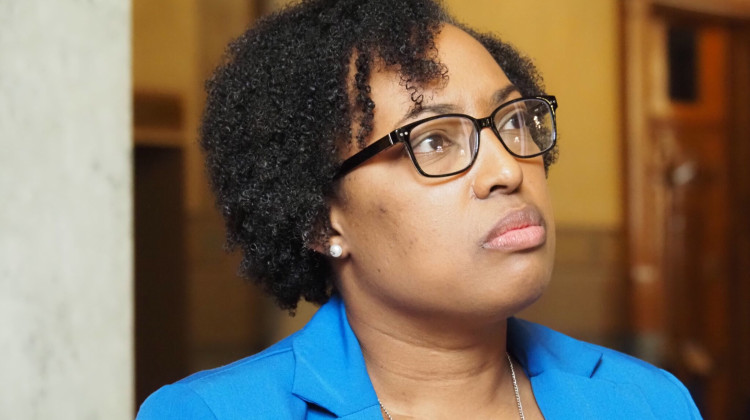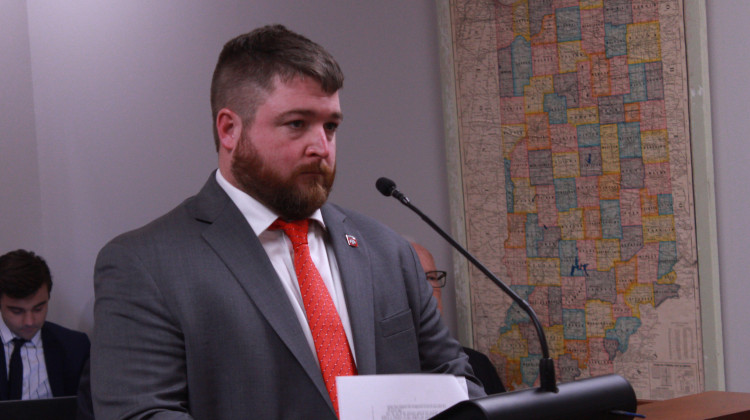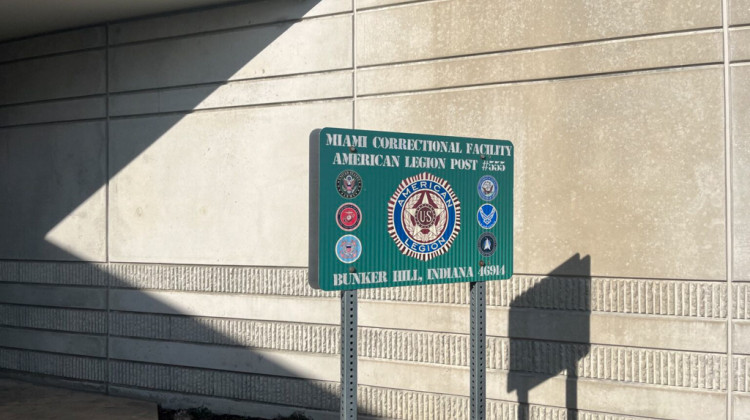
Secretary of Public Safety Jennifer-Ruth Green following a presentation with the Senate Appropriations Committee on March 13, 2025.
Whitney Downard / Indiana Capital ChronicleThe Indiana Office of Inspector General filed a formal ethics complaint Friday against former Public Safety Secretary Jennifer-Ruth Green — accusing her of ghost employment and misuse of state property.
The OIG investigation began months before her abrupt resignation last Friday.
The filing, which was signed by Inspector General Jared Prentice, accuses Green of violating multiple provisions of the state’s ethics code.
It builds on a remediation agreement first reported this week by the Indiana Capital Chronicle, which prohibited Green from using state resources for political purposes and cautioned her against inappropriate conduct toward employees in her office.
The next step is a public meeting before the state ethics commission, where the inspector general will present evidence and Green will have an opportunity to respond. It’s up to the commissioners to decide whether the allegations constitute violations of Indiana’s ethics code and what sanctions should follow.
Green also could enter into a settlement agreement.
She did not immediately respond to the Capital Chronicle’s request for comment Friday afternoon.
The inspector general also has a duty to refer any evidence of potential criminal activity to prosecutors, who would decide independently whether to pursue charges.
Ghost employment is a felony under Indiana law.
Allegations in the complaint
The complaint alleges Green improperly involved state employees in her political campaign, used state property for personal and political purposes, required staff to perform personal errands on state time and retaliated against an employee who cooperated with investigators.
According to the complaint, she directed two state employees to generate campaign content for her “Elect Jennifer-Ruth Green” Facebook page and instructed another staffer to proofread posts.
Investigators said those actions not only violated the state’s ban on political activity during official duties, but also amounted to ghost employment because the work was performed on state time.
The OIG further alleged that Green held a meeting with a political director from the National Republican Congressional Committee during working hours and used a state conference room for that meeting.
The complaint states that Green also required two employees to retrieve her assigned state vehicle from Crown Point, Indiana — a personal task performed on state time that the OIG said also violated the ghost employment rule.
Separately, investigators pointed to Green’s use of her official title on her private “Battle-Proven Leadership” website, where she sells training seminars and a book.
By attaching her state position to those business ventures, the complaint argues, Green violated the state’s prohibition against misuse of state property. The inspector general also alleged she used her state vehicle, and instructed an employee to do the same, for personal errands.
The complaint further accuses Green of retaliation against an employee who cooperated with the OIG’s investigation.
According to the filing, Green threatened one of her employees “with either demotion or termination” after learning the employee had provided information to the OIG. The complaint further asserts that Green “made derogatory comments” and called the employee “demeaning names” after the employee sat for an interview and responded to subsequent requests for information.
State law prohibits retaliation against employees who participate in inspector general investigations.
Five different employees are named within the complaint. The Capital Chronicle has redacted the names from the document.
What comes next
The filing comes only days after the Capital Chronicle published a previously confidential remediation agreement Green signed with state officials in July.
That document laid out restrictions for her continued employment, including an explicit ban on using state vehicles for political purposes, a directive not to ask employees to staff political events and a warning not to comment on employees’ appearances.
The remediation agreement was intended to correct problems and allow Green to remain in office, while the OIG continued its investigation.
Green ultimately resigned on Sept. 5, after serving less than nine months as Indiana’s first secretary of public safety.
The complaint was released one day after the Indiana State Ethics Commission held a closed-door meeting in Indianapolis.
Commissioners met for less than 20 minutes in an executive session to consider a probable cause affidavit and “an individual’s alleged misconduct.” Green’s case was not listed on the public agenda, however, and commissioners declined to comment afterward.
By law, complaints remain confidential until probable cause is established.
The process requires the commission to determine whether ethics violations occurred and, if so, what sanctions are appropriate. Penalties can include fines and even barring a person from future state employment, per statute.
Green’s resignation marked the first departure of a cabinet-level official in Gov. Mike Braun’s administration.
Following her appointment in January, Green’s responsibilities included oversight of the Indiana Department of Homeland Security, the Department of Correction, the Criminal Justice Institute and the Parole Board.
Indiana Capital Chronicle is part of States Newsroom, a nonprofit news network supported by grants and a coalition of donors as a 501c(3) public charity. Indiana Capital Chronicle maintains editorial independence. Contact Editor Niki Kelly for questions: info@indianacapitalchronicle.com.
 DONATE
DONATE






 Support WFYI. We can't do it without you.
Support WFYI. We can't do it without you.